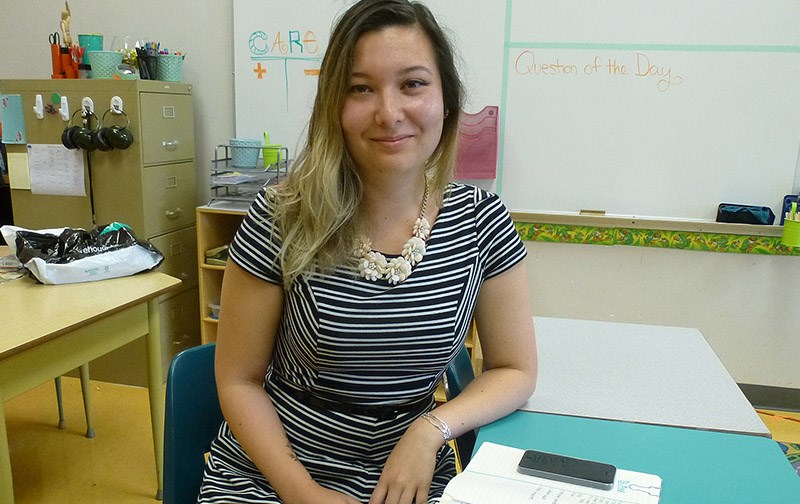Passion.
It's a word that is used a lot these days when discussing people following their dreams.
On a wall in Sarah Peterson's Grade 4/5 classroom at Alderson elementary school, the word "Passion" is pinned on construction paper to get kids to post their ideas for projects, questions they want answered and drawings and books they've made.
"To me, it shows me what the kids are interested in," Peterson said, "and that fuels what I focus on in my teaching."
Letting the kids guide the lessons based on their interests and passions seems like an odd way to start the school year but for Peterson, a new teacher who completed her training last December at Simon Fraser University, the passion wall is an important way to get the education conversation going.
Now, a few days before school starts on Sept. 6 the wall is empty but for some beautiful wildlife photos. In a month, Peterson expects it will be crammed with student postings.
A Port Moody secondary school grad, Peterson said she is well versed in the new curriculum rolling out for kindergarten to Grade 9 students this year (and for Grade 10 to 12 students next year), and is looking forward to implementing it after having studied it for a year.
Opening up a notebook full of scribbles in blue ink, including a list of school supplies she needs, Peterson shows how a Social Studies segment on Canada will move from a big idea (the overarching theme in the new curriculum), such as what makes people uniquely Canadian, to content or subject areas and topics students will study more deeply using their own questions and research.
For example, students will learn history by creating a book of famous Canadian people in whom they are interested, they will learn about Port Moody history and the early mills that provided jobs for people with a field trip to the old mill site along Port Moody's Shoreline Park, and they will study old forestry tools Peterson has gathered from her family to gain knowledge about how logging was done.
"We will also do as many hands-on projects as possible," said Peterson, who said she likes the new curriculum because it provides flexibility to match students' interests.
Not long out of school herself, Peterson says she is comfortable letting students lead the inquiry, and even dictate how much time should be spent on a particular subject area. For example, when she started a writer's workshop during a substitute teaching job last spring, the goal was to let students work on their writing projects for one hour a week.
"But the students kept on asking me when they could work on them," so the time spent was extended, she said, and the result was several biographies, comic books and even a few novels. The students might not have have realized it, but they also picked up writing skills along the way.
Peterson also plans "the genius hour project," where kids get to pick a topic for more in-depth study. It will likely involve internet research, creating a jumping off point for a discussion about internet safety and how to do research properly online.
While it may seem new to outsiders, Peterson said the new curriculum simply organizes ideas, content and strategies teachers have been using for years. She even saw some of them used in a school in Wales where she volunteered during the last year of her undergraduate studies.
"What's new," Peterson said, "is the use of the word 'inquiry'" to explain the method used to help students take control of their learning.
Still, it seems there is a lot of work to be done to convey these new teaching strategies to parents, who worry about another education fad. And how will students be tested, when even Grade 4 and 7 students still have to take Foundation Skills Assessment tests in reading comprehension, writing and numeracy?
Peterson isn't worried. Although teaching to 30 different student interests might be challenging, the new teacher is confident that she will still be able to teach the required materials even though her strategies for doing so might be a bit different.
"My teaching can work with FSAs," she says, "but why not do it in a way that includes something they are passionate about?"
She acknowledges that there will likely be bumps along the way but with the support of another SD43 teacher who is volunteering to help Peterson with lesson plans through a mentorship program for new teachers, and by collaborating with experienced Alderson teachers, Peterson says she is more than ready to start a new year and a new job with the new curriculum.
• Want to know more about the new B.C. education curriculum? Visit https://curriculum.gov.bc.ca.



